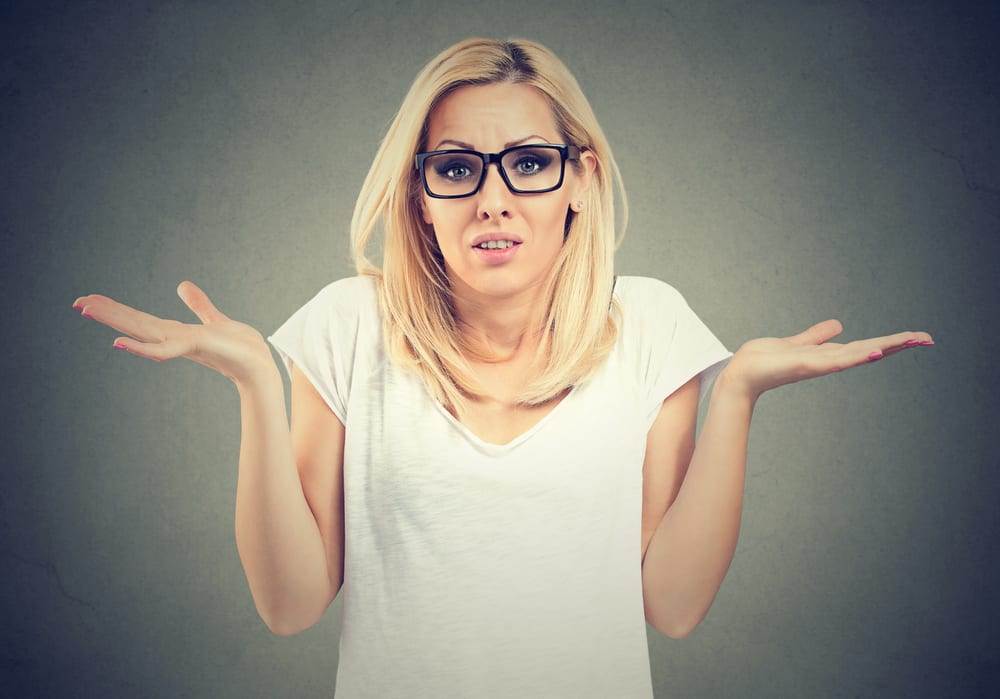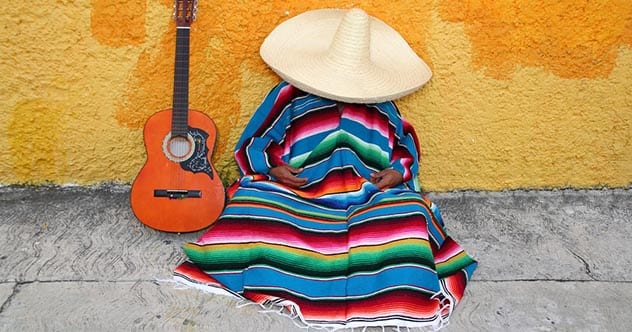 Weird Stuff
Weird Stuff  Weird Stuff
Weird Stuff  Mysteries
Mysteries 10 Tragic Disappearances and Deaths in Joshua Tree National Park
 History
History 10 Ways Childhood Really Sucked in the Old West
 Music
Music 10 Name Origins of Famous Bands from the 1990s
 Religion
Religion 10 Biggest Turnarounds by the Catholic Church
 Weird Stuff
Weird Stuff 10 Unbelievable Times Laws Had Unintended Consequences
 Humans
Humans Ten Historic Women Who Deserve Way More Credit Than They Got
 Movies and TV
Movies and TV 10 Films That Spawned Major Lawsuits
 History
History Ten Times Towns Were Wiped Off the Face of the Earth
 Creepy
Creepy 10 of the Most Disturbingly Haunted Public Houses in the UK
 Weird Stuff
Weird Stuff 10 Niche Subcultures That Are More Popular Than You Might Think
 Mysteries
Mysteries 10 Tragic Disappearances and Deaths in Joshua Tree National Park
 History
History 10 Ways Childhood Really Sucked in the Old West
Who's Behind Listverse?

Jamie Frater
Head Editor
Jamie founded Listverse due to an insatiable desire to share fascinating, obscure, and bizarre facts. He has been a guest speaker on numerous national radio and television stations and is a five time published author.
More About Us Music
Music 10 Name Origins of Famous Bands from the 1990s
 Religion
Religion 10 Biggest Turnarounds by the Catholic Church
 Weird Stuff
Weird Stuff 10 Unbelievable Times Laws Had Unintended Consequences
 Humans
Humans Ten Historic Women Who Deserve Way More Credit Than They Got
 Movies and TV
Movies and TV 10 Films That Spawned Major Lawsuits
 History
History Ten Times Towns Were Wiped Off the Face of the Earth
 Creepy
Creepy 10 of the Most Disturbingly Haunted Public Houses in the UK
Top 10 Origins Of Controversial Stereotypes
Stereotypes have been around for as long as man and, for the most part, they aren’t negative. There are plenty of stereotypes about people, places, and things that are complementary—even if they aren’t true.
10 Fascinating Origins Of Pop Culture Stereotypes
Then there are the negative stereotypes which can be pretty nasty. For most negative stereotypes, there is about 0.01% of truth mixed into supposition, prejudice, bigotry, and just plain lies.
Here are ten of the most controversial.
10The Dumb Blonde

It’s a fairly common belief that blondes aren’t smart, and who hasn’t said they were having “a blonde moment” after doing something particularly foolish? The ditzy blonde has been a trope of television and film for decades.
The Origin: The notion that blondes are dumb comes from a play called Les Curiosités de la Foire,[1] which was based on Rosalie Duthé, a courtier who was blonde, stupid, and sexually available. That play first premiered in 1775, so the stereotype has been around for a while.
The Reality: Blonde hair is the result of a mutation, which has been around for about 10,000 years. Studies have shown that hair color and intellect aren’t related, and in some, it was found that the median IQ for blonde women was higher than women with different hair colors.[2]
Fun Fact: There are plenty of blonde women who prove this stereotype false, including NASA Astronaut Karen Nyberg, Professor Lisa Randall of MIT, J.K. Rowling, Meryl Streep, and many more.
9 Asians Can’t Drive

When Asiana Airlines Flight 214 crashed in San Francisco in 2013, two people died, and scores more were injured, but it wasn’t long before the “Asians Can’t Drive” stereotype was running rampant on Twitter. “Of course the Korean plane crashed. Asians can’t drive, what makes them think they can fly a plane,” and similar comments were common after the accident.[3]
The Origin: The precise origin of the stereotype is unknown, though it is pervasive, and has an Urban Dictionary page devoted to it.[4] It likely rose from seeing Asian immigrants driving in the United States, as many were driving for the first time. As a result, the stereotype was less about Asian drivers than it was about new drivers.
The Reality: Ironically, the opposite is true when it comes to Asian drivers. There are fewer fatal crashes in East Asian countries when compared to the United States. The stereotype is also contrary to the belief that Asians are good at everything. The meme, “Difficulty Level: Asian” is popular on Tumblr, where it showcases examples of Asian people accomplishing incredible feats.[5]
Fun Fact: According to the CDC, Asians are statistically better drivers than other populations in the United States, with female Asian drivers rating the highest in terms of safety.[6] White, non-Hispanics account for the highest rate in deadly crashes.
8 Irish People = Potato-Eaters

There are several stereotypes about Irish people by the rest of the world, but the most common concerns their supposed fondness for potatoes.
The Origin: When it comes to potatoes, Ireland is well known as a lover of the crop, going back to the late 16th century. Potatoes became a staple crop, but when the Great Famine hit the country in the 1840s, this led to a mass exodus. More than a million people left Ireland during this time. Because of the crop’s failure, especially in 1847, a surge of unwelcome Irish immigrants were negatively associated with the potato.[7]
The Reality: While it is true that Irish people of the 18th and 19th centuries required potatoes as their primary source of sustenance,[8] the famine of the 1840s changed this. Modern Ireland enjoys potatoes as much as the next country, but the nation’s economy isn’t tied to its success as it was in the 18th and 19th centuries. The Irish agricultural industry of the 21st century relies on a diverse selection of crops, including sugar beets and barley.[9] Potatoes come in third, but in far less tonnage than the previous two.
Fun Fact: The country that consumes the most potatoes is China,[10] not Ireland. Ireland is ranked as the 59th of 158 countries in terms of potato consumption.[10]
7The French Are Cowards

There’s a stereotype that France is unwilling to fight in wars, and would rather surrender than fight. This belief is rooted in a misunderstanding of French involvement in recent conflicts, and it remains pervasive throughout the American military even though the U.S. and France are allies.
The Origin: France wasn’t thought of as a war-hating country until recently. A common misconception of their actions in WWII suggested the country didn’t put up a fight when the German Army crossed the Ardennes. France surrendered to Hitler in 1940 following an intense battle,[11] which has helped reinforce the belief that France would rather surrender than fight.
The Reality: For most of France’s history, the country stood as one of the mightiest militaries in the world. Before the French Revolution, French was the international language of trade and business, much like English is today. It wasn’t until the years following the Revolution that France succumbed to numerous military defeats. Still, the country always put up a fight, never waving the white flag at the first onset of hostilities. The defense of Paris cost France 1.3 million dead—there was no surrender until all was lost.[12]
Fun Fact: France provided support to the American colonists during the Revolutionary War, and were instrumental in helping to defeat King George III. In the 20th & 21st-centuries, France helped defeat the Kaiser, Hitler, and the nation continues to support international conflicts around the world with its technologically advanced and well-trained military.
6 Men Are Better Workers Than Women

Women have been fighting against gender stereotypes since the dawn of humanity when the hunter/gatherer culture first began. While there have been improvements in most countries where women’s rights are concerned, the belief that men are better workers remains in most industries throughout the world.[13]
The Origin: All cultures throughout history have had gender roles of different types, but the modern stereotype of women being less capable than men has manifested in unequal pay, fewer promotions, and less opportunity for women in the workplace.
The Reality: Studies have consistently demonstrated two things: men and women are capable of performing the same tasks from changing a lightbulb to running a country, and women are often more productive than their male counterparts.[14] One study found that women were 10% more productive than men in the workplace.[15]
Fun Fact: One stereotype about women is that they are better at multitasking than men, but it turns out, that isn’t true. A study by PLOS One found that women aren’t better at multitasking than men; they just do more work in less time, so it appears that way.[16]
5Black People Love Fried Chicken & Watermelon

Fried chicken and black people have been negatively associated with one another for more than a century. The dish was brought to the States by Scotts and West African slaves, who added their blend of seasoning, which became a prominent feature of southern fried chicken made by Slaves throughout the 19th century.
The Origin: The negative association between African Americans and fried chicken goes back to the 1915 film Birth of a Nation. Claire Schmidt of the University of Missouri wrote on the film’s role in creating the negative correlation:
“[A] group of actors portraying shiftless black elected officials acting rowdy and crudely in a legislative hall…And one of them was very ostentatiously eating fried chicken. That image really solidified the way white people thought of black people and fried chicken.”[17]
In addition to fried chicken, African Americans have been associated with watermelon as a traditional slave food. This was reflected in the song “The Ice Cream Man” from 1916, which was initially titled, “Nigger Love A Watermelon Ha! Ha! Ha!”[18]
The Reality: Everyone loves fried chicken and watermelon. There isn’t a racial requirement to enjoying it, which was clear when masses of people of all races flocked to and fought for a Popeyes fried chicken sandwich in 2019.[19]
Fun Fact: According to the National Chicken Council, African Americans make up 16.3% of U.S. chicken consumption while Hispanics are higher at 18.3%.[20]
4Jews Are Cheap

The belief that Jews are cheap has been around since the first days of Christianity. Since then, it has permeated every culture that has included Jews for thousands of years. The stereotype was used by Nazi propagandists who scapegoated the German Jewish population in the 1930s, and it remains a well-known stereotype to this day.[21]
The Origin: The belief that Jews will do anything for a buck comes from the story of the Last Supper. About 2,000 years ago, Judas Iscariot was paid thirty shekels for betraying Jesus to the Romans, resulting in his capture and crucifixion. From that point on, Jews were negatively associated with money and finances.[22]
The Reality: Whether the Biblical account of the Last Supper was true or not, the actions of a single man two millennia ago have no bearing on people today. Some Jews are good with money, and some aren’t. During the middle ages, when Jews were considered to be great financiers, most were poor. It wasn’t until the Industrial Age that Jews began working in finance and banking, such that they became wealthy, but this was hardly the norm for the average Jew in Europe and North America.
Fun Fact: There are numerous Jewish billionaires in the world today, including George Soros, Mark Zuckerberg, and Michael Bloomberg, to name a few.[23]
3 Mexicans Are Lazy

The fact that Americans think of Mexicans as lazy can be seen in every depiction of a farmer reclining against a cactus with a sombrero pulled down to cover his eyes as he sleeps. It’s a widespread belief in the United States, and it has led to an overall negative depiction of Mexican people.[24]
The Origin: The belief that Mexicans are lazy stems from a long line of historical prejudices made against Mexicans by Americans. The general belief that Mexicans are flooding the borders to take American jobs isn’t new; it’s been ongoing for well over a century. The problem continues, and in 2016, the Texas State Board of Education called for textbooks covering Mexican American Studies for the state. One sample included text describing “Mexicans as lazy, and Mexican Americans as cultural separatists, stubbornly resisting assimilation.”[25]
The Reality: Mexican workers are demonstrably, not lazy, and most work longer and harder than the average American. According to the Organization for Economic Cooperation and Development, an average Mexican worker provided 2,246 hours of labor in 2015. That same year, the average American worked 1,790 hours.[26]
Fun Fact: The belief that Mexicans are lazy is common in the United States, while, at the same time, the belief that Mexicans are taking American jobs exists, effectively canceling each other out.
2 The Angry Black Woman

It is widely believed that black women tend to be more aggressive and loud when they get angry. At the U.S. Open final in 2018, Serena Williams received a code violation and was fined. She went off on the referee and was labeled as an Angry Black Woman in the press with pictures of her yelling, demanding an apology.[27] Professor Trina Jones, a Duke University scholar who specializes in racial and socioeconomic inequality, spoke out on the incident.[28] “Black women are not supposed to push back, and when they do, they’re deemed to be domineering. Aggressive. Threatening. Loud.”
The Origin: Minstrel shows of the 19th century parodied African American women by insinuating they were overly aggressive and angry. They dubbed them as “Sassy Mammies,” which were women who defied social norms. This belief was further developed into the term “Sapphire,” which is an insult referencing the dominant, and often masculine portrayals of enslaved black women.
The Reality: Black women get angry like everyone else in the world, and there is no truth to the belief that they are somehow more aggressive than anyone else.[29]
Fun Fact: Some of the world’s most powerful, successful, and influential women have carried the label, including Oprah Winfrey, Michelle Obama, and many more.
1 All Muslims Are Terrorists

There’s a common belief in the United States and Europe that ascribes the majority of terrorist attacks to Muslims. This has resulted in numerous stereotypes and prejudicial acts carried out against Muslims, including “Flying while Muslim” and many more.
The Origin: For most people who believe this stereotype, the terrorist attacks on 9/11 were the origin. Those coordinated attacks were conducted by a group of Muslim men who believed they were doing the will of Allah. Immediately following the attacks, Islamaphobia in the United States turned up to 11, and numerous attacks followed. The addition of fearmongering by vocal critics with a soapbox made the problem worse, and a general fear of Muslim people remains common around the world.
The Reality: The terrorists who carried out the attacks on 9/11 did so because of their personal beliefs, but their perverted view of Islam doesn’t line up with the vast majority of Muslims across the world. Muslims make up around 24% of the global population, which amounts to around 1.8 billion people.[30] Of those, only about 0.00009% have committed acts of terror or believe terrorism is justified as part of their religious beliefs.[31]
Fun Fact: In the United States, more terrorist acts are carried out by white citizens than any other race or ethnicity. Between 1980 and 2005, non-Muslims committed 94% of all terrorist attacks in the United States, including 9/11.[32]
For more lists like this, check out 10 British And American Stereotypes That Science Says Are Bull, and 10 Pious People Who Defy Common Religious Stereotypes
About The Author: Jonathan is a graphic artist, illustrator, and writer. He is a Retired Soldier and enjoys researching and writing about history, science, theology, and many other subjects.








